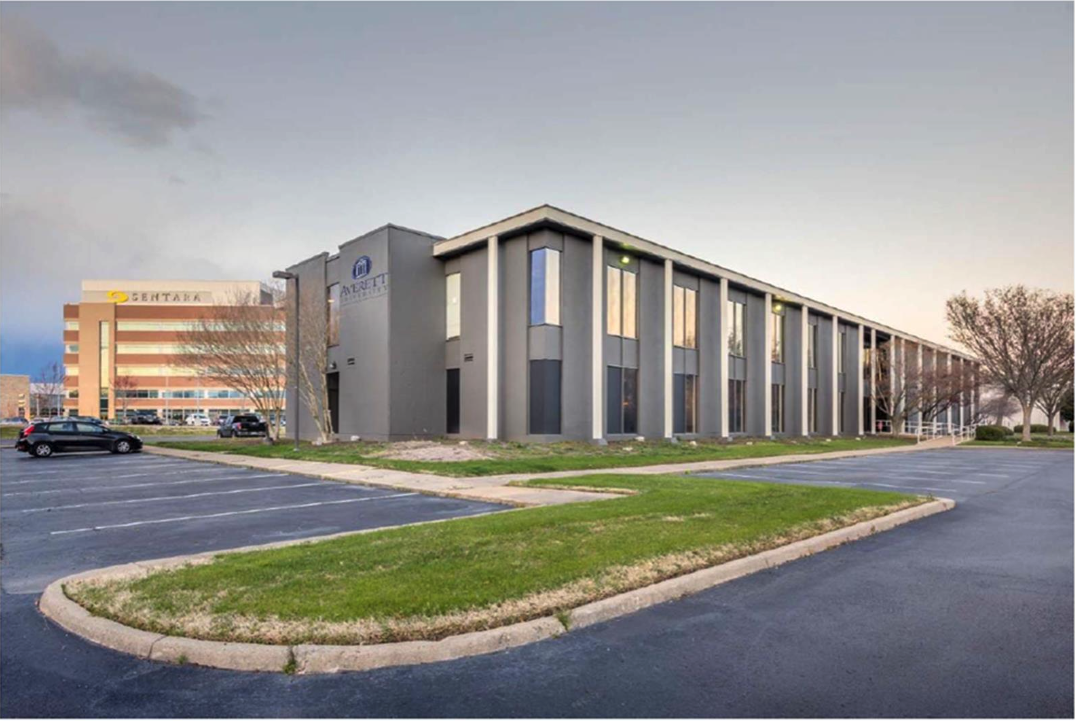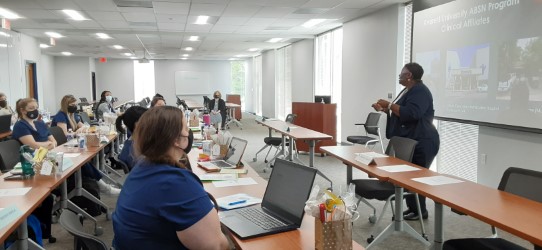Averett University is helping students find  their calling within an in-demand industry with a new Accelerated Bachelor of Science in Nursing (ABSN) degree program in Hampton Roads. The first cohort of students started May 3 at the new Averett School of Nursing ABSN Learning Center in Norfolk, Va.
their calling within an in-demand industry with a new Accelerated Bachelor of Science in Nursing (ABSN) degree program in Hampton Roads. The first cohort of students started May 3 at the new Averett School of Nursing ABSN Learning Center in Norfolk, Va.
Averett’s accredited ABSN program creates a new professional path for students with non-nursing bachelor’s degrees – or with at least 60 non-nursing college credits – to help them shift their career and become a nurse sooner. The hybrid format combines online curriculum with hands-on application in an interactive, state-of-the-art learning lab, and can be completed in as few as 16 months. Students also will apply their skills through clinical rotations at Bon Secours, the University’s health care partner in Norfolk.
“This exciting new program builds upon our nursing education foundation and growing health sciences offerings at Averett,” said Averett University President Dr. Tiffany M. Franks. “The past year has shed a light on how greatly we rely on well-trained, compassionate health care workers. By providing this further access for students who have newly found their calling to nursing, we are helping to fulfill our mission of preparing students to be catalysts for positive change – something we’ve never needed more.”
 “The University designed the program so students can put their critical thinking and technical skills to work in a safe environment and then apply their learning in a clinical setting through rotations at top local health care facilities,” said Dr. Frances Gray, Averett’s ABSN program director. “The idea is to prepare students for this helping profession while filling the pipeline of nurses in our community.”
“The University designed the program so students can put their critical thinking and technical skills to work in a safe environment and then apply their learning in a clinical setting through rotations at top local health care facilities,” said Dr. Frances Gray, Averett’s ABSN program director. “The idea is to prepare students for this helping profession while filling the pipeline of nurses in our community.”
The program has annual start dates in January, May and August. For more information, visit https://absn.averett.edu/.
A looming shortage
Nationally, the need for nurses is well documented, with an estimated 175,900 openings for registered nurses (RNs) per year by 2029, according to the American Association of Colleges of Nursing. Virginia is faring better than the nation as a whole in the total number of nurses needed to serve a burgeoning population, though a rise in the number of retiring nurses and those leaving the profession creates a need to fill the demand.
“But the nursing shortage is only part of the challenge,” Gray said. While the number of students interested in entering the field is plentiful, Gray said the opportunity for them in college and university nursing programs is lagging. In 2019, more than 80,000 qualified applicants with a passion for nursing were turned away from college and university nursing programs nationwide. The reasons: a lack of faculty, clinical placements and space, according to the American Association of Colleges of Nursing.
“This program is meeting a critical workforce need while also expanding the University’s footprint even further across the Commonwealth,” said Franks.
Good-paying careers, opportunity to contribute to the greater good
Nursing offers a promising, stable career, with a starting salary ranging from $59,540 to $113,240 nationally, according to the Bureau of Labor Statistics’ latest Occupational Employment Statistics (OES) report.
In Virginia, the average base salary of nurses is nearly $38 per hour, based on estimates from Indeed.com.
“Beyond the salary, there is redeeming value in working in a career you love while giving back to something bigger than yourself,” Gray said.
A history of educating students
Averett has a long history of educating students at its Danville campus dating back to 1859, including nearly 40 years helping adults, including members of the military, advance in their careers.
The new ABSN program will complement Averett’s School of Nursing offerings at its main campus, including a four-year traditional Bachelor of Science in Nursing program, and its Master of Science in Nursing (MSN) program with a focus in two key areas – Family Nurse Practitioner and Emergency Nurse Practitioner.
Nursing has been one of the most popular majors among incoming traditional students, and in 2019, the first-time student pass rate on the National Council Licensure Examination (NCLEX-RN) exam was 100%, compared to a national average first-time pass rate for students who graduated with a bachelor’s degree in the field of 91%.
